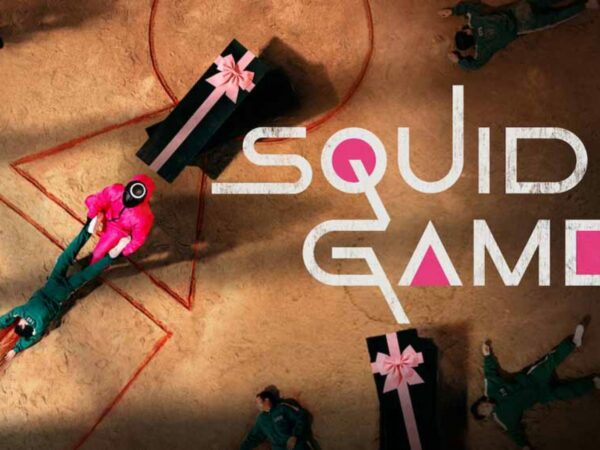I don't know what the reaction will be like in foreign countries, but Korea's reaction to the squid game is mixed.
There was a good column about the squid game, so I translated it.
😵 This contains a number of spoilers about the drama "Squid Game".
 |
"Squid Game", a random survival game that is consistent only with compassion for middle-aged men.
- We Geun-woo
Is there a need to listen to the story of a villain who contradicts himself?
I should start writing with a spoiler. In the last episode of Netflix's original series "Squid Game", which was released on September 17, Oh Il-nam (Oh Young-soo), who people thought was a game participant but was actually a host of the game, tells game winner Sung Ki-hoon (Lee Jung-jae) that the reason he did it was because of his boredom in life. In response, Sung Ki-hoon is angry, saying, "Did you make people do that for fun?" However, a completely different question arises from the perspective of viewers who have watched all the games hosted and devised by Ilnam. That's the only thing you designed to have fun with that money and power? For example, think of the first game, Mugunghwa flowers bloomed(red light, green light). The real beauty of this game lies in the dilemma of controlling the speed of the phrase "Mugunghwa flowers bloomed" (usually slow and 1.5 times faster at the last minute), cooperation in the process of saving the lined participants caught by the tagger, and saving only part of them. However, "The Mugunghwa Flower Bloomed" in "Squid Game" is just a survival in which a participant caught by a tagger is shot and killed.
 |
The persona of Hwang Dong-hyuk, the real designer of the game, seems to resemble the persona of Ilnam(player 1), who emphasizes only stimulation through cruelty while removing all the fun details that the game has originally. The same is true of the fact that they argue that boring games are fun, and that they have a dog's poo philosophy of faith and distrust in humans while dying, regret over the old alley scenery where his wife and son lived, and justification that the game was not forced to play. Everything Ilnam says is close to an ex post excuse brought by a game designer who failed in fun. And all of the excuses are retroactive to the work called Squid Game itself. The result of expanding the idea of playing very simple old children's games with their lives, which is neither great nor bad, into a nine-part series, is the Squid Game.
In fact, "Squid Game" is a work that would be better to be solved in the form of a receptacle such as "99 Reasons Why 'Squid Game' is not good than a column of one breath". This is because even the drawbacks are sporadic and not organic. In an episode titled "Equal World", the frontman of the black mask, the conductor of the game, killed the crew who had communicated with the participant (Yoo Sung-joo) and said, "Everyone is equal in this game. All participants compete fairly under the same conditions. "It's giving people who have suffered from inequality and discrimination in the outside world the last chance to fight and win equally", he says. Nonsense. This is exactly another version of Lee Jun-seok’s(Korean politician) fair competition discourse.
It is deceptive to artificially create a winner-take-all game and say it as if it were an equal and primitive world. Talents that are advantageous in many games, including power, are unfairly distributed, and most of the game design itself is left to the participants’ luck. Luck seems to be distributed fairly at first glance, but in fact, Ki Hoon and many others who participated in the crazy game with huge debts are those who have been driven all the way here as they have no luck.
 |
When a glass factory worker, who had no presence, showed the talent to distinguish tempered glass through reflection of light in the fifth game, the frontman, who used to talk about an equal fight, turns off the lights to prevent him from showing his ability. Frontman's fairness is embodied in a way that deprives the weak of the opportunity to demonstrate their abilities. It is not difficult to criticize the contradictions of this survival world from such self-contradicting, and it will be meaningful. Besides, absurd expedients have already emerged openly in this game. Han Mi-nyeo (Kim Joo-ryeong), who secretly brought in a lighter from outside, easily passes by heating a needle with fire in a dalgona challenge game. In a world where if people can't split the dalgona according to the shape, people will be shot and killed by a host right next to you, Han Mi-nyeo hides under a slide and does this well. To criticize how contradictory it is in reality that everyone is controlled to fight equally, their control is only selectively omnipotent. Therefore, it is more reasonable to say that this work was designed recklessly rather than in a worldview that cannot be agreed upon.
Nevertheless, what remains somewhat consistent in this world is the sentiment of compassion for middle-aged korean men. The game in the work designed by Ilnam is often focused on middle-aged memories rather than simplicity. The old alley where the marbles game was played is a reproduction of the alley where Ilnam lived, and Cho Sang-woo (Park Hae-soo), a junior in Ki Hoon's neighborhood and a senior student in Seoul National University's business administration department, recalled dalgona from a hint from Kang Sae-byeok (Jeong Ho-yeon) about sugar water. Ki-hoon, who survived the final match with almost 100% luck, shows his pride as the main character for the first time when he succeeds in “Amhaengeosa" across the middle bridge in the last squid game and puts the name out of his mouth. An old game as a stage where a middle-aged man who was driven to the edge of a cliff can return splendidly. On the other hand, games that will be more familiar to middle-aged women, such as jackstones, are only mentioned in the conversations of participants, but memories of the past do not work as much advantage for female characters.
Among the three major female characters, the middle-aged Mi-nyeo deals with gangster Jang Deok-soo (Heo Sung-tae) using sex as a strategy, while the other two, Sae-byuk and Ji-young (Lee Yoo-mi), are set up as young people unfamiliar with old games, and used instrumentally in the narrative. The flat character of Ji-young, who suddenly pops out of the game and dies for Sae-byuk, saying thank you for bringing herself into a team while confessing her unfortunate past during the game, is like a narrative cog roughly inserted for the tragic beauty of the episode. Sae-byuk, which left a deep impression with actor Jung Ho-yeon's passionate performance, nevertheless dies as a means for Sang-woo's depravity and Ki Hoon's awakening ahead of the final match.
On the other hand, it is surprising to compare with the previous female characters how various profiles were given to wrap Ki Hoon, the main character, as a good person. He is a useless scum. He used not only his old mother's allowance but also his old mother's card to gamble. However he also has a painful memory of Dragon Motors' reinstatement struggle. Although he is an irresponsible biological father who does not pay any child support to his divorced wife (Kang Mal-geum), his sincerity toward his daughter can't be compared to daughter's family taking her to a family restaurant. The dignity within a human being is certainly an attractive element as the protagonist, but the squid game throws out ex post facto excuses for him without a break rather than facing Ki Hoon's irresponsibility and looking at the humanity in it. When he answers that he has no choice but to stand by his coworkers, the unavoidable circumstances are solely up to Ki Hoon who was not there at the time of childbirth. The story, which had been dotted with excuses for Ki Hoon since the first episode, completes a fantasy of a middle-aged Korean man who has never lost deep responsibility for his children and mother in the last game when the corrupt Sang-woo put a knife in his neck and repeated "my mom" countless times after falling into regret, saying, "If I play like this with my brother (Ki Hoon), my mom...”. The title of the last episode, "A Lucky Day", based on Hyun Jin-gun's novel of the same name, which depicts the story of Kim Cheom-ji, who hit his wife but cared warmly with his heart, seems to be an expression of unconsciousness.
That's why I'm not at all curious about Season 2 of "Squid Game", which explicitly hinted at next season. I am not curious about the past of a frontman, a big actor named Lee Byung-hun and why he became the commander of the squid game. In the previous quote, he said he would give new opportunities to people suffering from inequality, but the game he directed himself is neither fair nor just. Do we need to listen to the story of a middle-aged male villain who contradicts himself again? In the last episode of season 1, we already listened to the story of Ilnam. I am not curious about the structure of how a huge survival game that even overseas V.I.P. take part in can exist. At the end of the work, the host is almighty enough to dissuade Ki-hoon from re-participating, but their almighty is optionally poor enough for Ki-hoon to recruit squid game participants to a sufficiently recognizable extent. It's better to let the villain's omnipotence go over to the acceptance of the work. If you try to give probability to it, only the creator's laxity will be revealed. I don't even wonder how Ki-hoon, who woke up as the winner of the squid game, will fight this huge organization. He won because of 90% of his luck and favor of the one man, not because of the ordinary greatness of the citizens. He symbolizes not a handful of humanity but the self-pity of a middle-aged Korean man. Of course, the probability of producing the next season of the work, which hit not only in Korea but also at the global level, will be higher than the probability of survival in the first game "The Mugunghwa Bloomed(Red light, green light)". There is no reason to deny it. As the game in the work proves, victory is not necessarily proportional to ability.
Source : https://www.khan.co.kr/national/media/article/202109241602005

Comments
Post a Comment